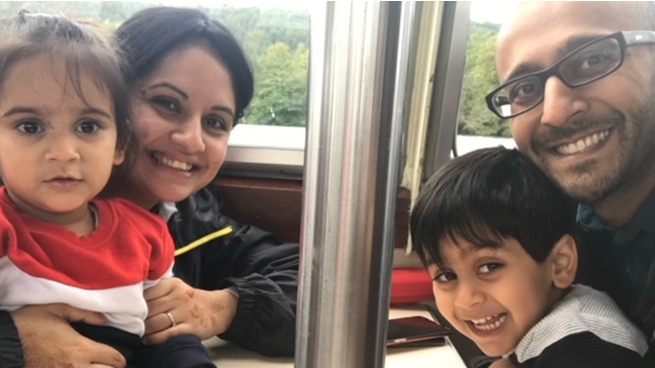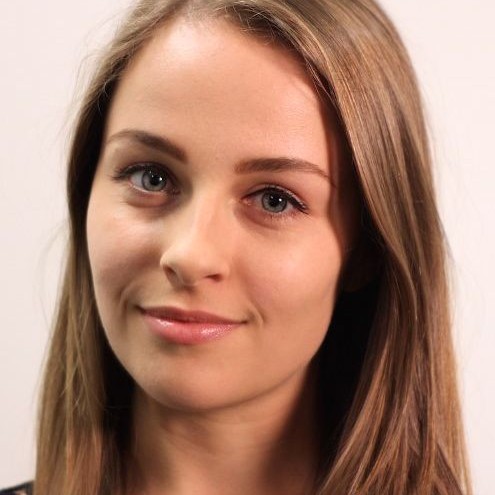The Woman Running The London Marathon In Memory Of Her Baby
Runner Sanam Saleh on how her family are building a positive legacy for their son through heart research fundraising and awareness

Sign up for workout ideas, training advice, reviews of the latest gear and more.
You are now subscribed
Your newsletter sign-up was successful
Sanam Saleh lost her first born, Idrees, at just five days old after he was born with hypoplastic left heart syndrome (HLHS). Her husband started running marathons to raise money for the British Heart Foundation (BHF) in Idrees’ memory, and this year, Sanam is taking on the challenge for the first time.
Could you tell me about your story and why you’re raising money for the BHF?
When I was pregnant with our first child, Idrees, he was diagnosed with a congenital heart defect. It was diagnosed quite early on in my pregnancy due to scientific research from the British Heart Foundation which has allowed doctors to detect these issues in the womb.
Idrees was diagnosed with one of the most serious heart defects, called HLHS. We were told that there was a 50/50 chance that he would make it to birth, and if he was born alive, he would have to have life-saving open heart surgery as a newborn to give him any chance at life. With HLHS, the heart doesn’t develop properly in the womb, so the surgery is necessary to be able to breathe and for the body to pump blood around properly.
Like most people, my husband and I didn’t know that this was something that could happen. The British Heart Foundation has a lot of informative fact sheets and offers help and support for families who find themselves in similar situations. We found that really useful to help prepare us for what was to come.
Our baby was born full term and everything went OK at the beginning, but he did have a few other complications, which meant that the doctors didn’t recommend him for the open heart surgery. He passed away at just five days old.
Ever since Idrees’ birth and death we’ve committed ourselves to his legacy. A big part of our grieving process and trying to make sense of everything that has happened has been to focus our efforts on raising money and awareness, not just for congenital heart defects but also other heart research. We learned more about the incredible work that charities like the British Heart Foundation were doing, and focused a lot of our fundraising efforts around raising money for them.
My husband ran his first marathon a few months after Idrees passed away, and he’s run three more since. This year will be my first one.
Sign up for workout ideas, training advice, reviews of the latest gear and more.
What made you decide to run the marathon this time?
I think you could call it a a postpartum high! We were in the hospital after I had my son. I turned to my husband and said, “One day I’m going to run a marathon.” To be honest, it was an idea that was completely “out there” because I’ve never really been a runner. At the time I said I was going to do it, I couldn’t even run 5K! But it felt like one of those life challenges that you set yourself.
I was supposed to run the London Marathon in 2020 and I was midway through my training when it was cancelled, which was a bit of a blow. In the end I deferred it to this year.
How have you found training for the marathon?
Training is tough! It’s gruelling, it’s time-consuming and it can feel very intense. The fact that you have to train alone, going out early in the morning, means that it can feel lonely at times.
When I set myself the challenge of running the marathon, I wasn’t a runner at all, but I’ve now completed a couple of 5Ks and a half marathon, so I’m a bit more experienced at this point and know what to expect.
Luckily the weather has been great, although the heatwave has brought its own challenges!
What do your two children think about you running the marathon and raising money?
They’re aware that I’m running it and they’re very excited. They actually think I’m going to win it! I don’t have the heart to tell them that that’s probably not going to happen, but they’re only five and six so I’ll let them think that for now!
They’ve been part of the mini marathon in their school, which is one of the London Marathon initiatives. Primary school children around the country commit to running a mini marathon, so they have a month to do 2.6 miles. The class walks or jogs around the playground and they count up how many laps everyone does. Everyone gets a certificate to say that they’ve completed the mini marathon.
What are your top tips for anyone running a marathon for the first time?
I’m a project manager, so I really approached it as just a massive project. My main tip would be to do a lot of research and prepare properly – it’s not something that you can blag. When training gets really intense, there are a lot of things you need to look at outside of the actual running, such as avoiding injury, conditioning and nutrition. Those things seem like extras, but in some ways they’re actually a larger part of preparing than the running itself.
Another thing would be to talk to people who have run a marathon before because they can give you invaluable advice.
What does it mean to you to be able to do this for the British Heart Foundation?
After everything that we’ve been through, we know that the biggest impact that anyone has in this life is the legacy that they leave behind. As parents of our son, who sadly didn’t live very long, we believe that it’s our responsibility to set his legacy. We commit to doing these challenging things with the intention of raising money for future parents who might find themselves in a similar situation, and through the light of making Idrees’ legacy as positive an impact as possible.
- How To Get A Charity Place For The London Marathon
- What It’s Like To Run The London Marathon For A Charity
You can donate to the British Heart Foundation on Sanam’s JustGiving page.
The British Heart Foundation is the official Charity of the Year for the 2022 TCS London Marathon. It aims to help heal hearts across the UK by aiming to raise over £3 million for research into regenerative medicine that could one day find a cure for heart conditions.
This year, Team BHF runners will be running to help fund cutting-edge research into regenerative medicine. The BHF has identified nine regenerative medicine research projects to benefit from the money raised at this year’s London Marathon. These projects aim to find ways to regrow, repair and replace damaged heart muscle and blood vessels – and could one day find a cure for heart failure.
Among this year’s BHF marathon runners is Professor Sanjay Sinha from the University of Cambridge, who is leading the groundbreaking research behind the Heart Healing Patch.
Made of stem cells, the patch could be applied to the heart to help repair damage caused by a heart attack and could help save and improve the lives of millions worldwide affected by heart failure. This year the BHF wants the nation to rally behind Sanjay and help get the Heart Healing Patch over the finish line. To find out more and to support Sanjay, visit gosanjay.bhf.org.uk

Sarah is an experienced health, fitness, nutrition and beauty writer, and was previously health editor at BBC Good Food. She has contributed reviews, interviews and features to Coach since 2019, covering exercise bikes, fitness trackers and apps, among other topics. In her free time, she can be found hiking, swimming, cycling or trying (and failing) to do a headstand on a yoga mat.
